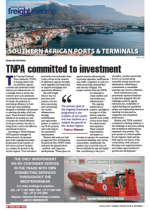The continued challenges plaguing ports in South Africa are generating heightened concern among logistics operators, who recognise the indispensable role these maritime hubs play as crucial gateways for the nation’s trade and commerce.According to experts at neutral consolidator SACO CFR, South Africa’s ports, some of the busiest and most important in Africa, are vital conduits for the smooth f low of goods, connecting the nation to global trade networks.“The ports have faced challenges in recent years, with congestion one of the major issues, particularly in Durban,” said Natasha Lawrence-Ramiah, branch manager in Johannesburg; Tracie Pelser, Cape Town branch manager; Beverly Brennan, Port Elizabeth branch manager; and Michelle Horner, Durban branch manager. “The high volume of cargo and limited infrastructure capacity has led to delays in processing and clearing goods, resulting in increased costs and inefficiencies for businesses. This congestion has also had a negative impact on the country’s competitiveness in the global market.”As logistics operators continue to grapple with the repercussions of the ongoing challenges at South Africa’s ports, it has become increasingly important to monitor developments closely and adjust strategies to mitigate the impact on operations. The resilience and adaptability of logistics networks has become paramount as operators navigate the complexities introduced by port-related challenges.“From an NVOCC perspective, we continue to offer customised solutions to meet the specific needs of our customers and provide tailored solutions for efficient and cost-effective cargo transportation,” said the SACO CFR team. “This includes looking at the most effective cargo routings, transit times and direct sailings to discharge, moving containers timeously, and coordinating the delivery from the port of discharge to the final destination.”They believe there are opportunities to improve the situation at the ports. These include the opportunity to invest in infrastructure development to expand their capacity and handle larger volumes of cargo. “The construction of new berths, terminals, and storage facilities would go a long way. By increasing their capacity, ports can attract more trade and accommodate larger vessels, thereby boosting their competitiveness,” they told Freight News.Improving connectivity by using different modes of transport would also improve cargo movements, while the adoption of digital technologies and automation could significantly improve port operations and efficiency.“It is just as important to explore collaboration opportunities with international ports and shipping lines as this can lead to knowledge transfers and further capacity building,” they said. “There is a growing focus on sustainability and reducing the environmental impact of port operations. South African ports can take the opportunity to implement green initiatives, such as using renewable energy sources, implementing waste management systems, and adopting eco-friendly practices. This will not only contribute to environmental conservation but will also enhance the ports’ reputations as responsible and sustainable partners.”

